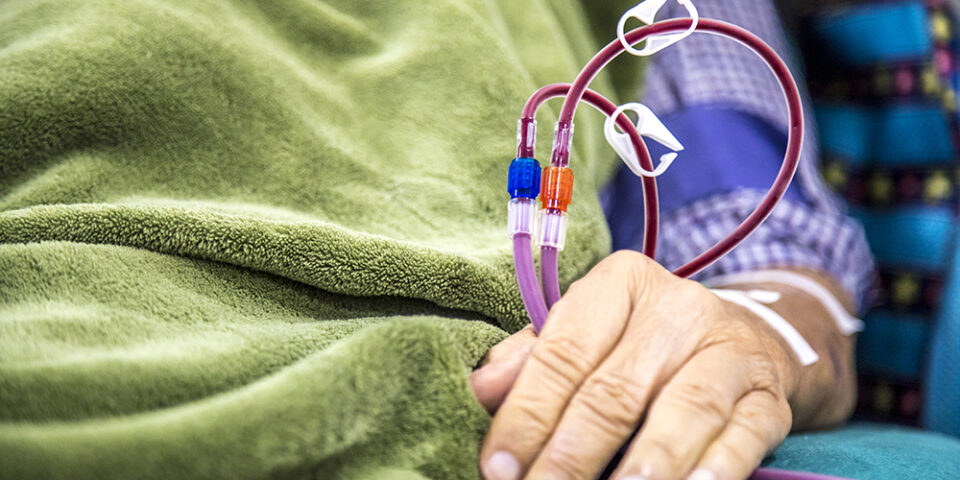When is it time to consider dialysis?
Your kidneys perform a critical function by helping your body filter toxins and get rid of waste products and excessive fluid. If your kidneys stop functioning well enough to perform this essential work, dialysis might be needed. Nephrologist Carlos F. Zayas, MD, explained how dialysis works and when it’s time to consider dialysis treatment.
How does dialysis work?
Your kidneys have a couple of different functions. They remove waste from your blood that your body doesn’t need and help control your fluid balance by eliminating fluids through making urine. When kidneys fail, dialysis is used to perform those functions and keep you alive.
Other kidney functions that dialysis could partially help are: the excretion of excessive salts and drug toxins, regulation of blood counts and handling of many vitamins.
There are two forms of chronic dialysis:
Hemodialysis is a mode of treatment where a patient will typically go to an outpatient setting and spend three to four hours connected to the dialysis machine by way of a catheter in a large vein and have their blood “cleansed.”
Peritoneal dialysis is a treatment that can be done in a patient’s home via a catheter that’s placed in their abdominal cavity with a machine that instills fluid into that cavity, in and out, either overnight or throughout the day.
“Dialysis is helpful, but it may only do about a third of what a normal kidney would do,” Dr. Zayas said. Ideally, dialysis serves as a bridge to keep a patient well until they can get the ultimate treatment for their kidney failure, which is a kidney transplant.
When is dialysis recommended?
Dialysis might be recommended for sudden (acute) issues, such as if your kidneys have been damaged due to toxins. Medication excess, such as taking too much Tylenol or ibuprofen-like preparations, or drinking too much alcohol can cause severe muscle breakdown leading to acute kidney injury.
For patients with chronic kidney disease, dialysis usually is recommended because there’s been a long history of uncontrolled hypertension or uncontrolled diabetes that has seriously damaged the kidneys.
Over time, patients progress through the different levels of chronic kidney disease, which go from one to five. Stage five is the final stage, and it is when the glomerular filtration rate (GFR) is really low. In this stage, a person has less than 15% kidney function and will have developed symptoms. Most patients will feel sick with function below 10% and most diabetic patients with function below 15%.
Symptoms can include:
- Anemia
- Shortness of breath
- Lack of energy
- Confusion and memory issues
- Severe fluid accumulation or edema
- Severe and uncontrolled nausea
- Sleep problems
“These patients need erythropoietin, which is a hormone like protein that tells your bone marrow to make more red blood cells,” Dr. Zayas explained. “When the kidneys fail or are failing, you make less and less of this hormone, and you become anemic.” The anemia makes you weak, fatigued and, if severe, short of breath.
Another symptom is uremia, which is caused by the accumulation of body waste and acid in the blood.
“With uremia, patients can develop very swollen ankles, feet, hands and faces, and despite using water pills, we can’t get the fluid off,” Dr. Zayas said. “They may become short of breath because they’re accumulating fluid in the areas like the lungs and around the heart. They cannot eat because they’re nauseous. Some people present to the emergency room because their blood pressure is very low, or they have a weird rhythm in their heart because their potassium is high or because they have so much acid accumulated in blood and the heart is starting to malfunction. All these symptoms would be an indication that dialysis is needed.”
How can you avoid dialysis if you have kidney disease?
Dr. Zayas said it’s important to manage the chronic conditions that can worsen kidney disease. Make sure your blood pressure and diabetes are under control.
Also, drink plenty of fluids, exercise, avoid gaining too much weight, don’t smoke or use illegal drugs and try to reduce stress. These lifestyle changes are a natural way you can improve your kidney function and avoid the need for dialysis treatment.
Find a doctor
Whether you’re looking for a primary care physician or need to see a specialist, we’re here to help with experienced, compassionate care near you.
Find a Doctor

